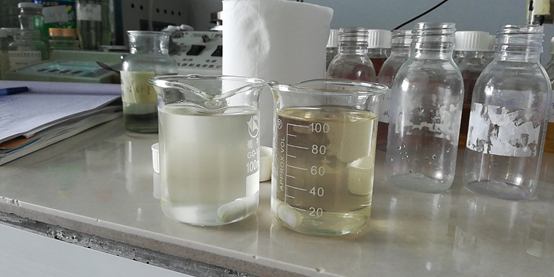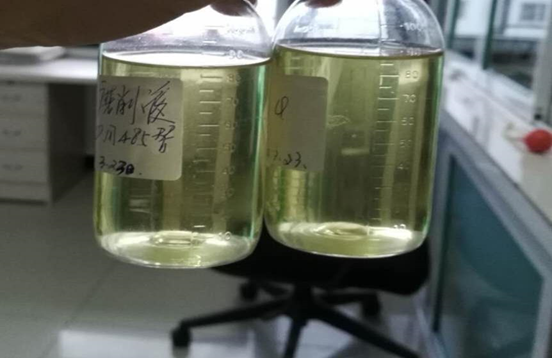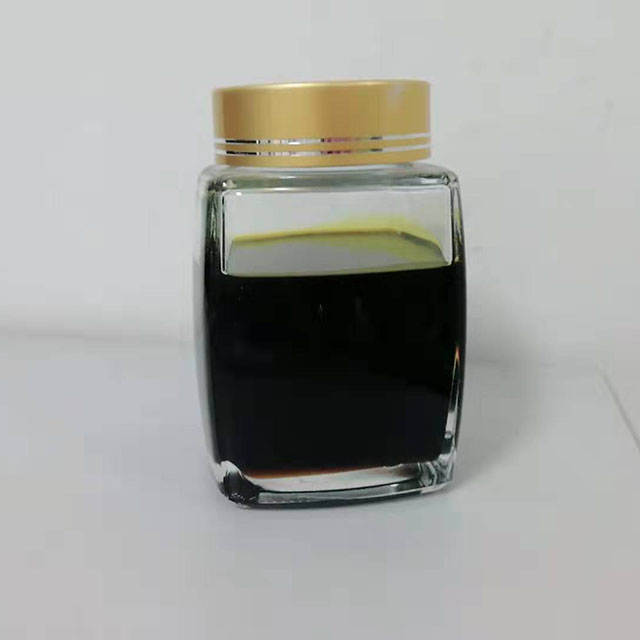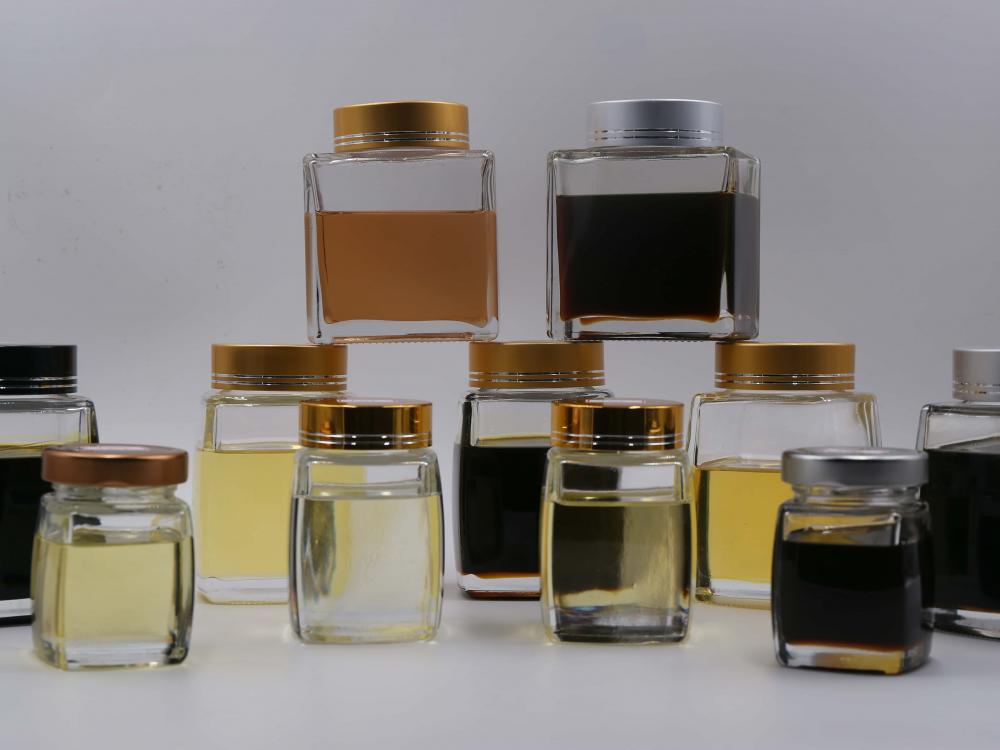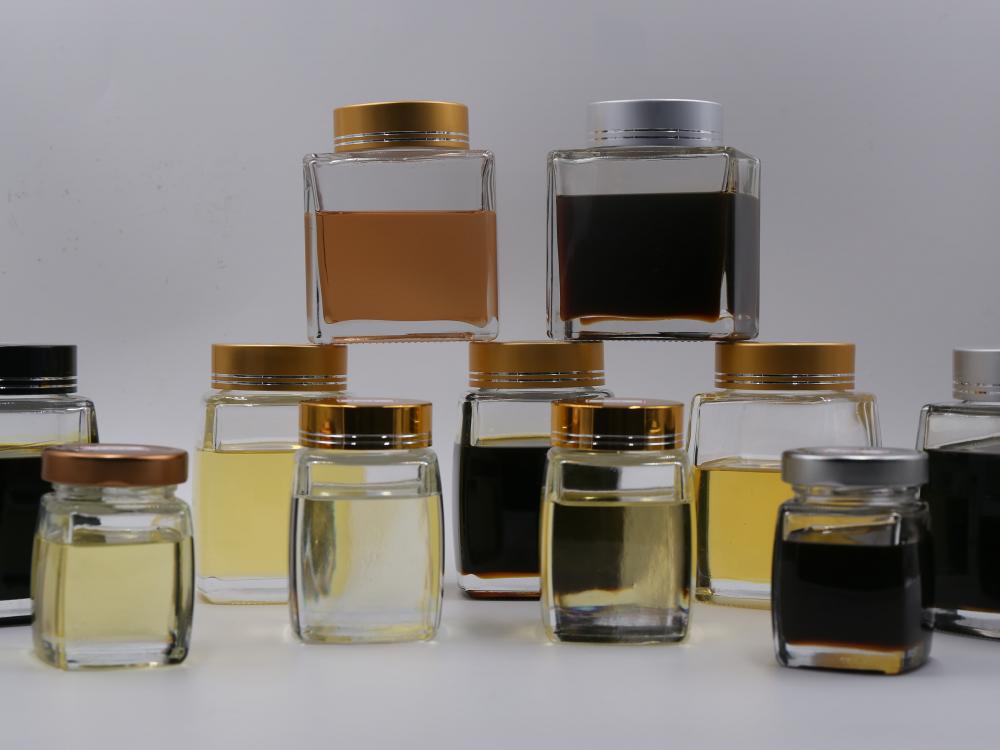Overall, Trimethylolpropane Ester Base Oil is a highly reliable and effective product with a wide range of applications. Its composition, which includes esters derived from trimethylolpropane and various fatty acids, provides excellent lubricity, thermal stability, compatibility, and solvency. These properties make it an ideal choice for use in various industries, including automotive, industrial, and aerospace, where high-performance lubrication is critical for efficient and reliable operation.
The reaction mechanism of Trimethylolpropane Ester Base Oil involves the esterification process, where trimethylolpropane reacts with fatty acids to form esters. This mechanism is crucial in determining the composition and characteristics of the final product.
The esterification reaction begins with the interaction between trimethylolpropane, a tri-functional alcohol, and fatty acids. The reaction takes place under controlled conditions, typically with the presence of a catalyst such as sulfuric acid or p-toluenesulfonic acid. The catalyst helps to facilitate the reaction and increase the rate of ester formation.
During the reaction, the hydroxyl groups (-OH) of trimethylolpropane react with the carboxylic acid groups (-COOH) of the fatty acids, resulting in the formation of ester bonds (-COO-). This process involves the removal of water molecules (dehydration) and the formation of ester linkages.
The choice of fatty acids used in the reaction can influence the properties of the Trimethylolpropane Ester Base Oil. Different fatty acids have varying chain lengths and degrees of saturation, which can impact the viscosity, lubricity, and thermal stability of the final product. Commonly used fatty acids include oleic acid, stearic acid, lauric acid, and many others.
The reaction mechanism also plays a role in determining the molecular weight distribution of the esters formed. The conditions of the reaction, including temperature, pressure, and reaction time, can affect the extent of esterification and the distribution of ester chain lengths. Controlling these factors allows manufacturers to produce ester base oils with specific properties and performance characteristics.
Once the esterification reaction is complete, the Trimethylolpropane Ester Base Oil undergoes further processing steps such as purification and filtration to remove any impurities or by-products. These steps help to ensure the quality and purity of the final product.
In summary, the reaction mechanism of Trimethylolpropane Ester Base Oil involves the esterification of trimethylolpropane with fatty acids. This process leads to the formation of ester bonds and results in a versatile base oil with excellent lubricity, thermal stability, and compatibility. The choice of fatty acids and the control of reaction conditions are essential in determining the composition and properties of the final product.
3. Use of the product Trimethylolpropane Ester Base Oil is a highly versatile and widely used product due to its exceptional properties and numerous applications. The unique composition of this base oil allows it to be utilized in various industries and sectors.
One of the primary uses of Trimethylolpropane Ester Base Oil is in the automotive industry. It is commonly employed as a lubricant in engines, transmissions, and different mechanical components. Its excellent lubricity helps reduce friction and wear between moving parts, improving overall engine performance and efficiency. Furthermore, it exhibits high thermal stability, making it suitable for use in engines that operate at high temperatures.
In the industrial sector, Trimethylolpropane Ester Base Oil finds application in machinery, hydraulics, and other heavy-duty equipment. Its superior lubricity and thermal stability ensure smooth operation and protection against wear, even under extreme conditions.
Additionally, Trimethylolpropane Ester Base Oil is extensively used in the aerospace industry, where high-performance lubrication is crucial. It is employed in aircraft engines, landing gear systems, and other critical components that require reliable and efficient lubrication.
The versatility of Trimethylolpropane Ester Base Oil extends to the manufacturing sector, where it is utilized as a lubricant in metalworking processes such as cutting, drilling, and milling. It provides excellent lubrication and cooling properties, enhancing tool life and improving surface finish quality.
Moreover, Trimethylolpropane Ester Base Oil is employed in hydraulic systems, providing efficient and reliable lubrication for hydraulic cylinders, pumps, and valves. Its compatibility with sealing materials ensures proper functioning and long-term durability of these systems.
In the marine industry, Trimethylolpropane Ester Base Oil is widely used in marine engines and lubrication systems. Its ability to withstand harsh marine environments, including exposure to saltwater and high temperatures, makes it an ideal choice for marine applications.
Apart from these sectors, Trimethylolpropane Ester Base Oil also finds usage in other industries such as power generation, construction, and agriculture. Its excellent lubricating properties, thermal stability, and compatibility with various materials make it a preferred choice for a wide range of applications.
In conclusion, Trimethylolpropane Ester Base Oil is a highly versatile product that finds applications in automotive, industrial, aerospace, manufacturing, marine, and other sectors. Its outstanding lubricity, thermal stability, and compatibility make it an essential component for ensuring efficient and reliable operation of machinery and equipment in various industries.
4. Production application examples in China China is a major producer and consumer of Trimethylolpropane Ester Base Oil, with a significant presence in the global market. The production and application of this versatile base oil in China have seen remarkable growth, driven by the country's booming automotive, industrial, and manufacturing sectors.
In China, Trimethylolpropane Ester Base Oil is extensively used in the automotive industry. It is employed as a lubricant in engines, transmissions, and various mechanical components of vehicles. With the rapid expansion of the automotive market in China, the demand for high-quality lubricants has increased significantly. Trimethylolpropane Ester Base Oil, with its excellent lubricity and thermal stability, has become a preferred choice for automotive lubrication, ensuring smooth operation, reduced friction, and enhanced fuel efficiency.
The industrial sector in China also relies heavily on Trimethylolpropane Ester Base Oil for lubrication purposes. It is widely used in machinery, hydraulics, and other heavy-duty equipment. China's manufacturing industry, which includes metalworking processes such as cutting, drilling, and milling, extensively employs Trimethylolpropane Ester Base Oil as a lubricant. The base oil's superior lubricating and cooling properties contribute to improved tool life and surface finish quality.
Moreover, the aerospace industry in China utilizes Trimethylolpropane Ester Base Oil for critical applications. It is employed in aircraft engines, landing gear systems, and other components that require reliable and efficient lubrication. The base oil's high thermal stability and lubricity ensure smooth operation, even in extreme conditions encountered in the aerospace industry.
In addition to these industries, Trimethylolpropane Ester Base Oil finds application in various sectors in China. The power generation industry employs it in lubrication systems of turbines and generators, where its thermal stability and lubricating properties are highly valued. The construction sector utilizes Trimethylolpropane Ester Base Oil in heavy machinery and equipment to ensure optimal performance and durability. In agriculture, this base oil is used in machinery such as tractors and harvesters, providing effective lubrication for smooth operations.
China's focus on promoting sustainable development and environmental protection has also led to the increased usage of Trimethylolpropane Ester Base Oil in environmentally friendly lubricants. With its biodegradable nature and excellent performance, it serves as an ideal choice for applications that require both high-performance lubrication and reduced environmental impact.
In conclusion, Trimethylolpropane Ester Base Oil plays a crucial role in various industries in China. Its exceptional properties, including excellent lubricity, thermal stability, and compatibility, make it a preferred choice for lubrication applications in automotive, industrial, aerospace, construction, power generation, and agriculture sectors. As China continues to drive economic growth and technological advancements, the demand for Trimethylolpropane Ester Base Oil is expected to further increase in the coming years.
5. Packaging and storage Packaging and storage are important aspects of handling Trimethylolpropane Ester Base Oil to ensure its quality and maintain its properties over time. Proper packaging and storage conditions can help prevent contamination, degradation, and other issues that could affect the performance of the base oil.
Trimethylolpropane Ester Base Oil is typically packaged in drums, intermediate bulk containers (IBCs), or bulk tanks, depending on the volume and requirements of the customer. These containers should be made of materials that are compatible with the base oil and do not react with or contaminate it. Commonly used packaging materials include stainless steel, high-density polyethylene (HDPE), or carbon steel drums with epoxy lining.
During transportation and storage, it is important to protect Trimethylolpropane Ester Base Oil from exposure to extreme temperatures, moisture, direct sunlight, and contaminants such as dust, dirt, or chemicals. The base oil should be stored in a cool, dry, and well-ventilated area, away from heat sources and open flames. Adequate ventilation is necessary to prevent the build-up of vapors or fumes that may be released from the base oil.
In terms of temperature control, Trimethylolpropane Ester Base Oil should be stored in a temperature range recommended by the manufacturer. Generally, it is advised to store the base oil at a temperature below 40°C (104°F) to prevent any potential degradation or deterioration. Excessive heat can lead to a decrease in viscosity, oxidation, and the formation of harmful by-products.
To ensure the integrity and quality of the base oil, it is important to handle and store it properly. This includes avoiding any contact with water, moisture, or incompatible materials. It is also essential to maintain a clean storage area, free from any potential sources of contamination.
Regular inspections should be conducted to check for any signs of leakage, damage to packaging, or deterioration of the base oil. If any issues are identified, prompt action should be taken to rectify the situation and prevent any further damage or contamination.
Proper documentation and labeling of Trimethylolpropane Ester Base Oil containers are also important. Each container should be clearly labeled with the product name, batch number, manufacturing date, and any relevant safety or handling instructions.
In conclusion, proper packaging and storage are essential for maintaining the quality and performance of Trimethylolpropane Ester Base Oil. Following recommended guidelines for packaging, temperature control, and storage conditions will help ensure that the base oil remains in optimal condition until it is used. By implementing these practices, users can maximize the benefits and longevity of Trimethylolpropane Ester Base Oil in their respective applications.
6. Product production process The production process of Trimethylolpropane Ester Base Oil involves several steps that ensure the high quality and purity of the final product. This process includes the following stages:
Raw Material Preparation: The first step in the production process is the collection and preparation of the raw materials. Trimethylolpropane, which is the main ingredient, is obtained through a chemical reaction involving the condensation of formaldehyde and isobutyraldehyde.
Esterification: Once the raw materials are prepared, the esterification process takes place. Trimethylolpropane is reacted with fatty acids, typically derived from vegetable oils or animal fats, in the presence of a catalyst. This reaction leads to the formation of Trimethylolpropane Ester, the main component of Trimethylolpropane Ester Base Oil.
Purification: After the esterification process, the Trimethylolpropane Ester undergoes purification to remove any impurities or by-products. This is typically achieved through a series of filtration, distillation, and evaporation processes. The purification step ensures the high quality and purity of the base oil.
Quality Control: Throughout the production process, quality control measures are implemented to ensure that the Trimethylolpropane Ester Base Oil meets the required specifications and standards. Samples are regularly taken and analyzed for various parameters such as viscosity, flash point, and chemical composition. Any deviations from the specified criteria are identified and corrected to maintain the consistent quality of the base oil.
Packaging and Storage: Once the Trimethylolpropane Ester Base Oil has been produced and quality-tested, it is packaged into suitable containers, such as drums or IBCs. The containers are carefully sealed to prevent any contamination or leakage. The packaged base oil is then stored in a controlled environment, following the recommended temperature and humidity conditions, to maintain its properties and extend its shelf life.
The production process of Trimethylolpropane Ester Base Oil is carried out with utmost care and precision to ensure a high-quality end product. Each step is closely monitored to maintain the desired chemical composition, purity, and performance characteristics. By following strict quality control measures and adhering to standardized procedures, manufacturers can produce Trimethylolpropane Ester Base Oil that meets the requirements of various industries and applications.
Zhengzhou Chorus
Lubricant Additive Co., Ltd is a professional Lubricant Additive manufacturer integrating R&D, production, sales and service, with more than 10 years of experience. We are focusing on various
Lubricant Additive Component &
Additive Package, as well as
Metal Working Fluid, component include
Pour Point Depressant,
Viscosity Index Improver, Antiwear/ Ep Additive , Antioxidant, Rust Preventative, Detergent,
Ashless Dispersant, etc.,



